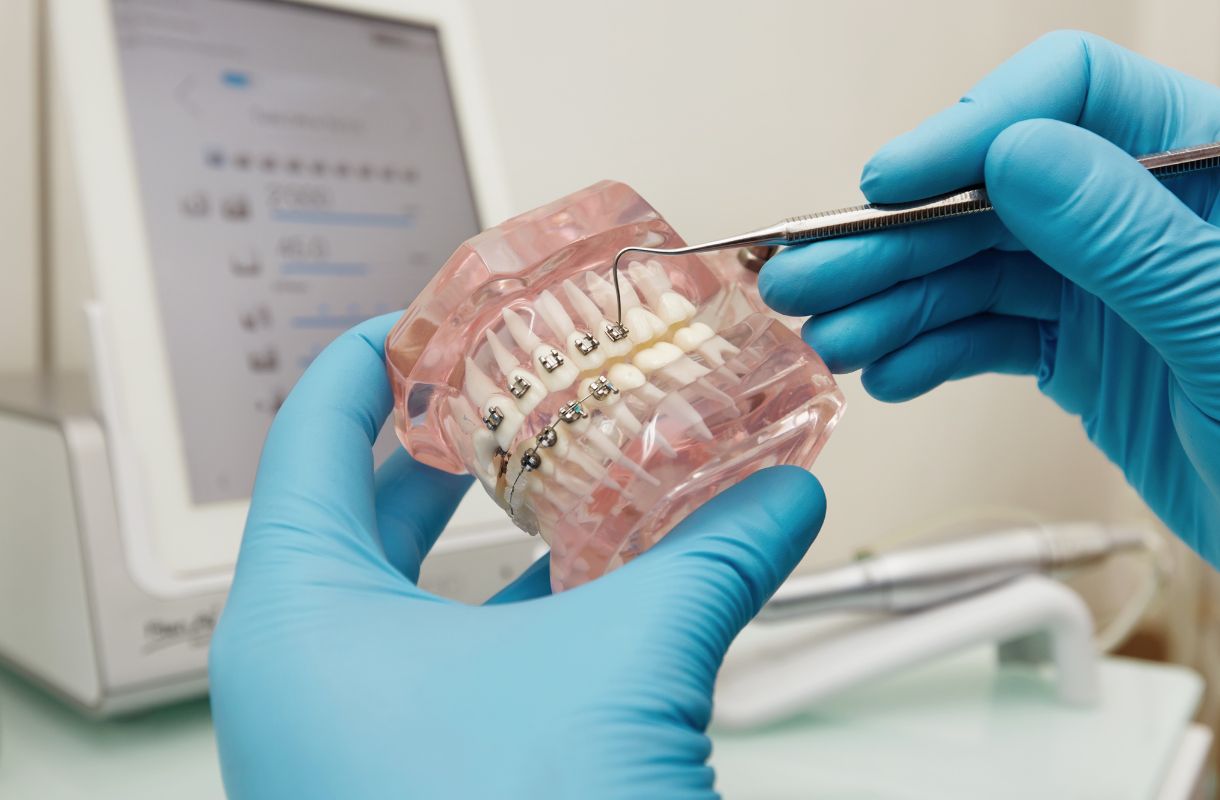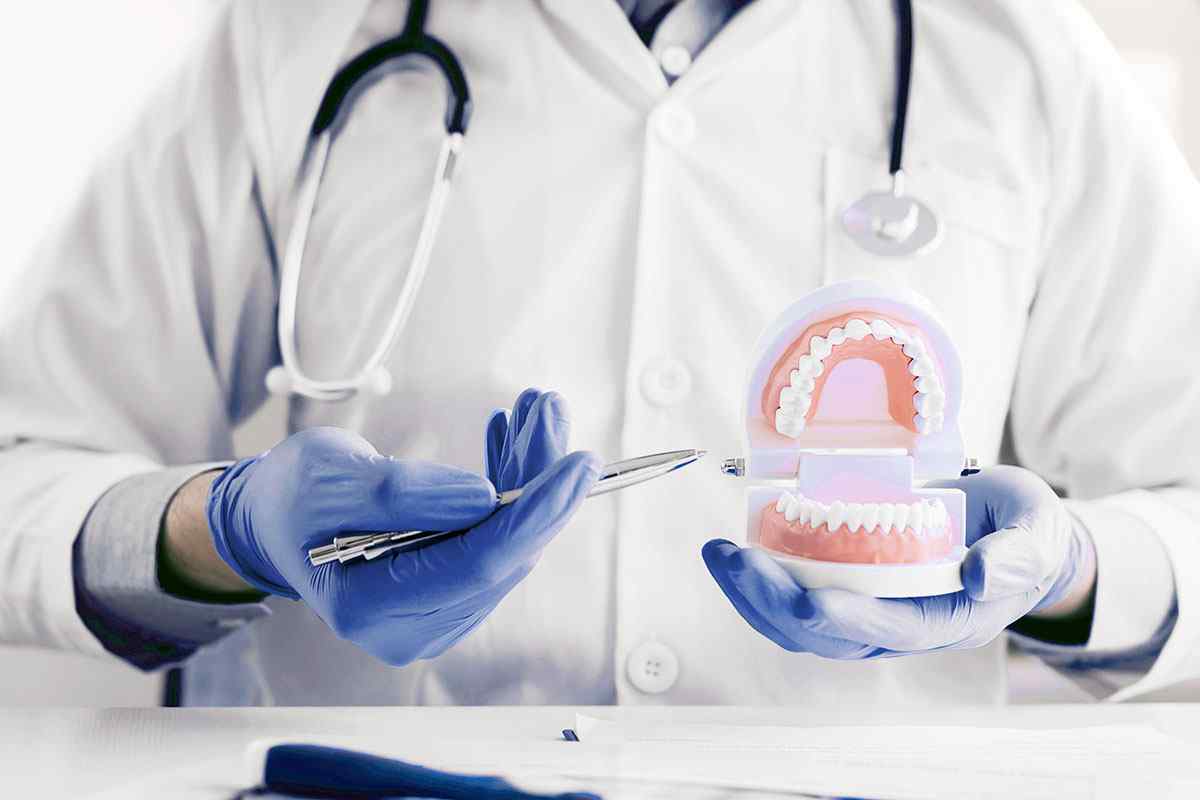Treatment of
Gum Disease
Treatment of gum disease involves deep cleaning techniques like scaling and root planing to remove plaque and tartar below the gumline. In more advanced cases, surgical procedures such as pocket reduction or gum grafting may be necessary.
The goal is to eliminate infection, reduce inflammation, and restore healthy gum tissue, preventing further damage and tooth loss.
What is Gum Disease?
Gum disease is an infection of the tissues that surround and support your teeth. It’s primarily caused by plaque, a sticky film of bacteria that constantly forms on teeth.
When plaque is not removed through regular brushing and flossing, it can harden into tartar, leading to inflammation of the gums.
Stages of Gum Disease
- Gingivitis: The earliest stage of gum disease, characterized by red, swollen gums that may bleed easily.
- Periodontitis: A more advanced stage where the gums pull away from the teeth, forming pockets that become infected.
- Advanced Periodontitis: The final stage where the fibers and bone supporting the teeth are destroyed, which may result in tooth loss.
Professional Treatment Options
Professional treatment for gum disease varies depending on the severity of the condition. Here are some common approaches:
Non-Surgical Treatments
Some non-surgical dental treatments include:
1. Scaling and Root Planing
This deep-cleaning procedure involves removing plaque and tartar from below the gum line (scaling) and smoothing out rough spots on the tooth root (planing) to eliminate bacteria and provide a clean surface for the gums to reattach to the teeth.
2. Antibiotic Therapy
In some cases, dentists may prescribe antibiotics to help control bacterial infection. These can be in the form of mouth rinses, gels applied to the gums, or oral medications.
Surgical Treatments
For more advanced cases of gum disease, surgical interventions may be necessary.
1. Flap Surgery (Pocket Reduction Surgery)
In this procedure, the gums are lifted back, and tartar is removed. The gums are then sutured back in place to fit snugly around the tooth, reducing the space between the gum and tooth where harmful bacteria can grow.
2. Bone and Tissue Grafts
When the bone supporting the teeth has been destroyed, grafts can help regenerate lost bone and soft tissue. This procedure involves placing natural or synthetic bone in the area of bone loss to promote new bone growth.
3. Guided Tissue Regeneration
This technique involves placing a small piece of mesh-like fabric between the bone and gum tissue to allow the bone and connective tissue to regrow.
At-Home Care and Maintenance
Professional treatments are crucial, but at-home care plays a vital role in managing gum disease and preventing its recurrence.
Daily Oral Hygiene Routine
For optimal oral health, brush twice daily with fluoride toothpaste, floss to clean between teeth and along the gum line, and use an antimicrobial mouthwash. This routine effectively removes plaque, prevents gingivitis, and maintains healthy gums.
Lifestyle Changes
To promote gum health, make key lifestyle changes: quit smoking, as it’s a major risk factor for gum disease; maintain a balanced diet rich in vitamins C and D while avoiding sugary and starchy foods; and manage stress, which can weaken your immune system.
Natural Remedies and Supplements
Natural remedies like oil pulling with coconut oil, green tea for inflammation, and aloe vera gel for soothing gums can support gum health. Vitamin C and Coenzyme Q10 supplements may also help, but consult your dentist before use.
Remember, these are not substitutes for professional care.
Monitoring and Follow-up Care
Regular dental check-ups every 3-6 months are vital for managing gum disease. After treatment, you may need more frequent cleanings.
Monitor your gums for redness, swelling, or bleeding, and report any changes to your dentist to prevent recurrence and ensure timely intervention.
Prevention: The Best Treatment
Maintaining healthy gums requires regular dental check-ups for early detection of gum disease, consistent oral hygiene practices to prevent plaque buildup, and managing risk factors such as smoking, poor diet, and uncontrolled diabetes. This proactive approach is essential for optimal gum health.
Cost of gum disease treatment in India
The cost of gum disease treatment in India varies based on the severity of the condition and the specific services provided by different clinics.
- Scaling and Root Planing: ₹4,000 – ₹16,000 per quadrant
- Flap Surgery: ₹10,000 – ₹40,000 per quadrant
- Bone Grafting: ₹15,000 – ₹50,000 depending on the procedure
- Regular Cleanings: ₹1,000 – ₹5,000 per visit
These prices can fluctuate significantly depending on the clinic chosen and the specific treatment plan recommended by your dentist.
FAQs
Can I live a long life with gum disease?
Yes, you can live a long life with gum disease if it is managed properly through treatment and regular dental care. Untreated gum disease can lead to serious health issues.
Can gum disease repair itself?
Gingivitis, the early stage of gum disease, can be reversed with good oral hygiene and professional treatment. However, advanced periodontitis cannot be fully cured but can be managed.
What is the fastest way to heal a gum infection?
The fastest way to heal a gum infection is to maintain excellent oral hygiene, including regular brushing and flossing, and to seek professional dental treatment as soon as possible.
How to make gums strong naturally?
To strengthen gums naturally, maintain a balanced diet rich in vitamins C and D, practice good oral hygiene, and consider using natural remedies like saltwater rinses or aloe vera.
Can salt water heal gums?
Yes, saltwater rinses can help reduce gum inflammation and promote healing by creating an environment that discourages bacterial growth and aids in cleaning the gums.
Periodontics
Get In Touch With Us
Call us
+91 9676100045 - Punjagutta
+91 7702425551 - Hitech City
+91 7702425551 - Hitech City
Email us
reception@smiline.com
Book An Appointment
Book a visit to Smiline, simply fill out the form below and we will contact you back regarding the intervention you require.



